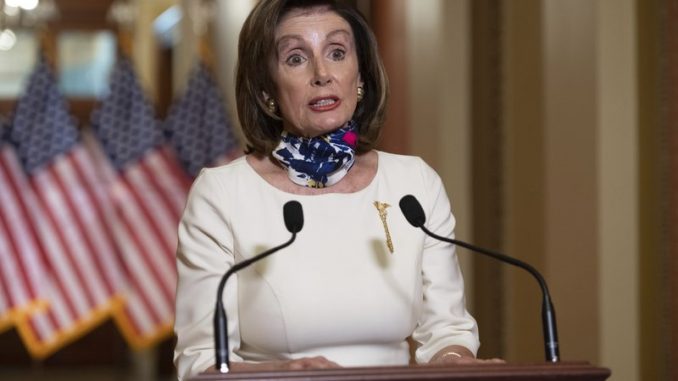
Democratic leaders are trying to assure nervous progressives that their priorities for climate change, paid family leave and other “human infrastructure” can still be delivered even with President Biden embracing a much more narrowly focused Senate infrastructure deal.
Speaker Nancy Pelosi (D-Calif.) made clear Thursday that the House won’t vote on any bipartisan infrastructure deal until the Senate also passes a larger package with Democratic priorities through the budget reconciliation process that can evade a GOP filibuster.
It was a move by Pelosi intended to calm the unrest among liberals, and it sent a strong signal to the other end of Pennsylvania Avenue as well.
“Let me be really clear on this: we will not take up a bill in the House until the Senate passes the bipartisan bill and a reconciliation bill. If there is no bipartisan bill, then we’ll just go when the Senate passes a reconciliation bill,” Pelosi said at a press conference in the Capitol.
“I’m very optimistic that it will happen. And I don’t want to say allay the fears — I don’t think they’re fears, they’re just advocating. And God bless them for doing that. But we’re not going down the path unless we all go down the path together,” she said.
A few hours after those comments, Biden said he would not sign the bipartisan proposal into law unless key portions of his agenda are addressed in a separate reconciliation package.
“I’m not just signing the bipartisan bill and forgetting about the rest of what I proposed,” Biden said at the White House.
The declarations from Pelosi and Biden increase the pressure on key centrists like Sens. Joe Manchin (W.Va.) and Kyrsten Sinema (Ariz.), who have been cagey about backing a Democrat-only package.
Manchin acknowledged Thursday for the first time that a reconciliation package is “inevitable.” He didn’t endorse a specific size or scope of a Democrat-only bill, but signaled that the details needed to be debated.
“Reconciliation is inevitable because basically Republicans I understand on the tax they don’t want to undo anything on the 2017 [bill]. For those who didn’t vote for 2017, there should be some adjustments. I’m open to that,” Manchin told reporters.
Maintaining Democratic unity is critical in a 50-50 Senate and a historically small House majority, where Pelosi faces the delicate task of making sure no more than four members of her caucus defect on President Biden’s top legislative priority.
At the same time, Pelosi must work in tandem with Senate Majority Leader Charles Schumer (D-N.Y.) to satisfy centrists such as Manchin and Sinema who are reluctant to scrap the filibuster and keen to reach a bipartisan compromise. Schumer stressed Thursday that infrastructure will proceed on the two tracks.
“If the Senate is going to move forward with a bipartisan infrastructure bill, we must also move forward on a budget resolution as well,” Schumer said on the Senate floor.
Rep. Pramila Jayapal (D-Wash.), the leader of the Congressional Progressive Caucus, said a recent poll of the group’s 95 members found overwhelming support for the House waiting to pass a bipartisan bill until a larger package with liberal priorities moves simultaneously.
“[Pelosi’s] been very clear since we talked to her that she doesn’t have the votes. And so then her statement today was fantastic,” Jayapal said.
“My focus is on, what is the package we are all going to agree on? And then I want to hear that we’ve got 50 Democratic senators — I want to hear them, Manchin, Sinema, say — that they are on board,” Jayapal said.
“I just feel like we can’t waste a lot of time on this bipartisan [portion],” she added.
The deal unveiled by the bipartisan group of nearly two dozen senators and the White House would amount to about $579 billion in new spending over five years. That would include $298 billion for transportation projects like roads and bridges, public transit and airports, as well as $65 billion for broadband expansion.
The financing options include redirecting unused unemployment insurance and COVID-19 relief funds and incentivizing private sector investment through public-private partnerships.
Pelosi may have some wiggle room on the bipartisan half of the infrastructure plan if any centrist Republicans get on board.
Rep. Brian Fitzpatrick (Pa.), the Republican co-chair of the bipartisan Problem Solvers Caucus, said Thursday that he hadn’t had a chance to review the details of the infrastructure deal but was open to supporting it.
“It’s either a good or bad deal on its own merits. It shouldn’t be contingent on anything else,” Fitzpatrick said.
Any GOP support for the bipartisan portion would also give space for some progressives dissatisfied with that half of the infrastructure plan to vote against it.
Rep. Alexandria Ocasio-Cortez (D-N.Y.) criticized the bipartisan infrastructure deal for its lack of diversity among the negotiators who stood with Biden at the White House to unveil it on Thursday.
“The diversity of this ‘bipartisan coalition’ pretty perfectly conveys which communities get centered and which get left behind when leaders prioritize bipartisan dealmaking over inclusive lawmaking (which prioritizes delivering the most impact possible for the most people),” Ocasio-Cortez wrote on Twitter.
“This is not to say that any/all bipartisan deals are bad but it’s to ask people to actually read what’s inside them instead of assume bipartisan=good,” Ocasio-Cortez continued. “‘Isn’t something better than nothing’ assumes that none of the individuals involved agreed to harmful policies. A huge assumption.”
Rep. Jamaal Bowman (D-N.Y.), another progressive lawmaker, said that he wanted to review both the bipartisan proposal and the reconciliation package before making a decision on either bill.
“We gotta see both at the same time. I’m not going to say I support one without seeing the other,” Bowman said.
But Bowman did have a condition: “It has to be big.”
Via The Hill
